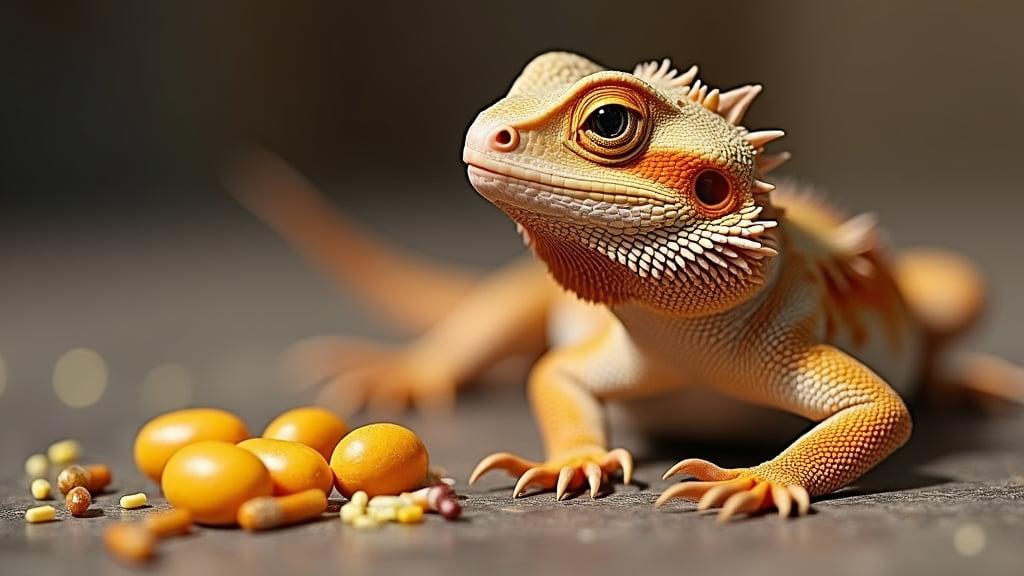Discover the essential supplements and vitamins for bearded dragons to keep them healthy and thriving. Learn from an exotic pet expert’s personal experiences and tips.
Introduction: The Secret to a Happy, Healthy Bearded Dragon
Owning a bearded dragon is a rewarding experience, but ensuring they remain in peak health requires more than just a proper diet and suitable habitat. Supplements and vitamins play a crucial role in your bearded dragon’s overall health. But with so many products on the market, knowing what your scaly friend truly needs can be daunting.
Drawing from my years of experience with exotic pets, I’ve crafted this comprehensive guide to help you navigate the world of bearded dragon supplements and vitamins. By the end of this post, you’ll be equipped with the knowledge to make informed choices for your pet’s optimal health.
The Essentials of Bearded Dragon Supplements
Calcium: The Backbone of Health
Without enough calcium, bearded dragons are at risk of metabolic bone disease (MBD), a serious condition that can lead to deformities and even death. Here’s how to ensure your dragon gets sufficient calcium:
Benefits of Calcium Supplements
- Bone Strength: Calcium supplements help in developing and maintaining strong bones.
- Muscle Function: Adequate calcium levels aid in proper muscle function and prevent cramping.
- Overall Growth: Especially crucial for juvenile dragons, calcium supports proper growth and development.
Choosing the Right Calcium Supplement
- Calcium with Vitamin D3: Essential for dragons that don’t get regular UVB exposure.
- Calcium without Vitamin D3: Suitable for those with ample UVB lighting.
Personal Experience
I’ve seen firsthand how quickly dragons can deteriorate without proper calcium. One of my bearded dragons, Spike, developed early signs of MBD. After consulting with a vet and adjusting his calcium intake, his health improved dramatically. Always keep an eye on your pet’s calcium levels and consult a vet if you notice any changes in their behaviour or mobility.
Multivitamins: Covering All Bases
While calcium is crucial, a broad spectrum of vitamins ensures overall health stability. Multivitamins bridge the nutritional gaps not covered by their diet.
Key Vitamins in Multivitamins
- Vitamin A: For vision and immune function.
- B Vitamins: Critical for metabolism and energy production.
- Vitamin E: Supports skin and tissue health.
Choosing the Right Multivitamin
- Reputable Brands: Always opt for established brands formulated specifically for reptiles.
- Frequency: Weekly dosing is typically sufficient, but always refer to package instructions.
My Go-To Multivitamins
I’ve tried several brands over the years, but Repashy Supervite has consistently delivered excellent results for my dragons. They tend to be lively and exhibit vibrant skin, a sure sign of good health.
Additional Supplements to Consider
UVB Lighting: A Natural Vitamin D3 Source
While not a vitamin per se, proper UVB lighting is indispensable for bearded dragon health. It facilitates natural Vitamin D3 synthesis, critical for calcium absorption.
Benefits of Proper UVB Lighting
- Bone Health: Prevents MBD.
- Mood and Activity Levels: Enhances overall well-being.
Hydration and Electrolytes
Hydration can sometimes be overlooked in reptile care. Electrolyte solutions can help maintain fluid balance, especially for dragons that are under stress or recovering from illness.
When to Use Electrolyte Solutions
- Illness Recovery: Aids rehydration during or after sickness.
- Stress Mitigation: Helps during periods of environmental stress or relocation.
Integrating Supplements into Your Dragon’s Routine
Dusting Food
The most common way to administer supplements is by dusting their food. Here’s how to do it effectively:
- Consistent Schedule: Establish a regular supplement routine to ensure your dragon gets the right nutrients consistently.
- Proper Dusting: Lightly coat live food (like crickets) or salads with the supplement powder to avoid overconsumption.
Monitoring and Adjusting Intake
Always monitor your dragon’s health and behaviour. Adjust supplement levels if you notice any signs of deficiency or overdose, such as lethargy, deformities, or changes in skin shedding.
Consulting a Vet
Any health concerns or drastic changes in behaviour should prompt a vet visit. Professional advice is invaluable for tailoring supplement needs to your specific pet.
Conclusion: Prioritise Nutrition for a Thriving Bearded Dragon
Providing the right supplements and vitamins is essential for your bearded dragon’s health and longevity. By understanding their dietary needs and incorporating high-quality supplements, you can ensure your pet leads a happy, healthy life. Always remain vigilant and consult your vet for any health concerns.
Internal Links
External Links
Stay informed, stay prepared, and give your bearded dragon the best care they deserve.
Feel free to share your experiences or ask questions in the comments section below!

